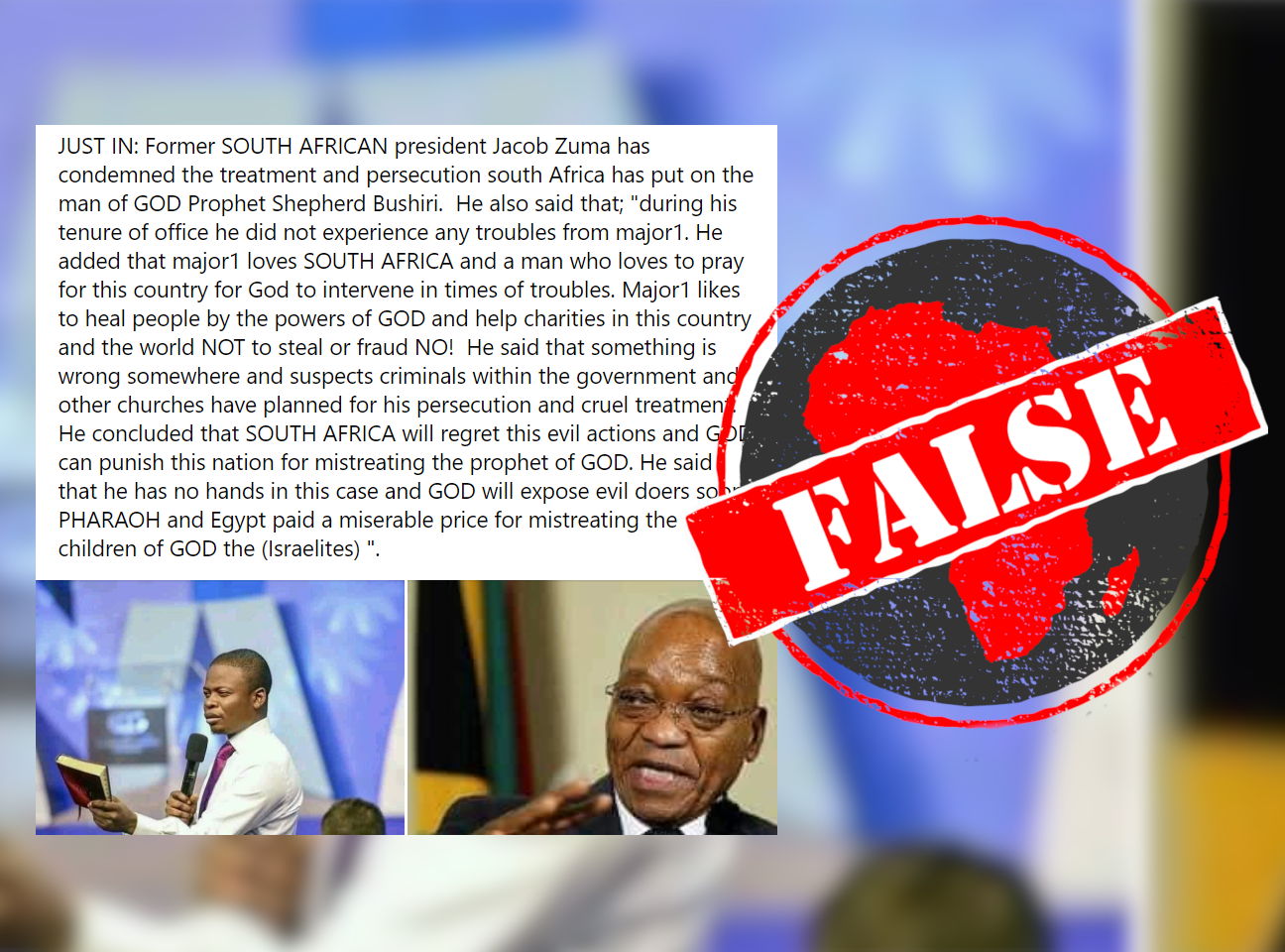A November 2020 Facebook post claims that former South African president Jacob Zuma has condemned the “treatment and persecution” of the Christian preacher, Shepherd Bushiri.
Bushiri, whose church is headquartered in Pretoria, South Africa, is wanted by the South African government on charges of fraud and money laundering.
Together with his wife, Bushiri fled to his home country, Malawi, in November 2020. The South African government has initiated an extradition process to prosecute the couple.
Has former South African president Jacob Zuma condemned this “persecution” of Bushiri?

The Facebook post quotes Zuma as saying he had no issues with Bushiri during his tenure in office. Zuma resigned under pressure in February 2018.
Zuma supposedly said Bushiri is a man that loves to pray for the country and “intervene in times of troubles”.
“He said that something is wrong somewhere and suspects criminals within the government and other churches have planned for his persecution and cruel treatment,” the post reads.
But the post does not provide a source and does not contain any details on where or when Zuma is supposed to have said this.
The poor spelling and grammar of the post is also cause for suspicion. It is unlikely that Zuma would have released a statement of this kind.
The Bushiris’ escape to Malawi is a developing story in South Africa and is being covered by all major news organisations in the country. If Zuma had made any statement about the Bushiris, it would have been widely reported on. But this is not the case.
Without any evidence to support the claim that Zuma has condemned the “persecution” of Bushiri, we rate this post as false. – Africa Check
Bushiri, whose church is headquartered in Pretoria, South Africa, is wanted by the South African government on charges of fraud and money laundering.
Together with his wife, Bushiri fled to his home country, Malawi, in November 2020. The South African government has initiated an extradition process to prosecute the couple.
Has former South African president Jacob Zuma condemned this “persecution” of Bushiri?

No evidence to support the claim
The Facebook post quotes Zuma as saying he had no issues with Bushiri during his tenure in office. Zuma resigned under pressure in February 2018.
Zuma supposedly said Bushiri is a man that loves to pray for the country and “intervene in times of troubles”.
“He said that something is wrong somewhere and suspects criminals within the government and other churches have planned for his persecution and cruel treatment,” the post reads.
But the post does not provide a source and does not contain any details on where or when Zuma is supposed to have said this.
The poor spelling and grammar of the post is also cause for suspicion. It is unlikely that Zuma would have released a statement of this kind.
The Bushiris’ escape to Malawi is a developing story in South Africa and is being covered by all major news organisations in the country. If Zuma had made any statement about the Bushiris, it would have been widely reported on. But this is not the case.
Without any evidence to support the claim that Zuma has condemned the “persecution” of Bushiri, we rate this post as false. – Africa Check
Republish our content for free
For publishers: what to do if your post is rated false
A fact-checker has rated your Facebook or Instagram post as “false”, “altered”, “partly false” or “missing context”. This could have serious consequences. What do you do?
Click on our guide for the steps you should follow.
Publishers guideAfrica Check teams up with Facebook
Africa Check is a partner in Meta's third-party fact-checking programme to help stop the spread of false information on social media.
The content we rate as “false” will be downgraded on Facebook and Instagram. This means fewer people will see it.
You can also help identify false information on Facebook. This guide explains how.



Add new comment